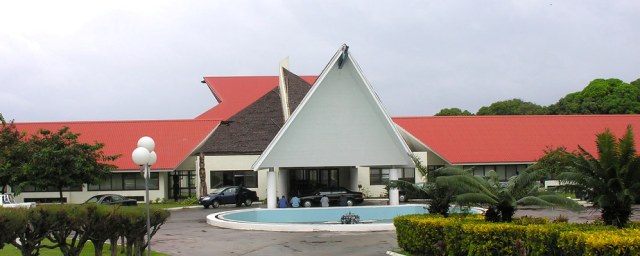 Vanuatu Parliament [Photo: Flickr}
Vanuatu Parliament [Photo: Flickr}
MPs elected Bob Loughman, leader of Vanua’aku Pati (Our Land Party), as Vanuatu’s new prime minister a month after inconclusive elections saw candidates from 18 parties elected to the 52-seat parliament. Loughman, a former education and trade minister, defeated the former foreign minister Ralph Regenvanu by 31 votes to 21.
The new PM has his work cut out. While the world grapples with the coronavirus pandemic, Vanuatu faces the additional trials of reconstruction following the second category-five storm in five years and volcanic eruptions. Cyclone Harold hit the 80-island archipelago after sweeping 27 people to their deaths from a Solomon Islands ferry, and wrecking buildings and causing flooding in Fiji and Tonga.
Vanuatu’s government declared two states of emergency in April: one for the pandemic and the other after Harold tore through Espiritu Santo – the island that inspired the musical South Pacific – and Pentecost. Winds of more than 200kph, with gusts of 235kph, tore down trees and caused the Sarakata river to rise by eight metres. Some 160,000 people had their homes, infrastructure and crops destroyed. Reports suggested 70% of buildings in Luganville, the second-largest town, were damaged. Four days before the cyclone made landfall in Vanuatu, Mount Yasur, a volcano on Tanna island, had erupted. As one resident drily noted, while much of the world stockpiled toilet paper, at least Vanuatuans knew how to deal with shortages and rationing.
With Vanuatu facing challenges unprecedented in modern times, it can appear hindered by its electoral process, which usually leads to coalition governments built on clientelism. Once again, no women were elected. Vanuatu remains one of just three nations with no women in parliament (along with Papua New Guinea and Micronesia), despite the high hopes of the first female-led party.
After Vanuatu – or the New Hebrides, as it was during the colonial era – emerged from joint Anglo-French ‘condominium’ rule, the country became one of the world’s few democracies to use the single non-transferable vote (SNTV) electoral system. This allows proportionality between seats and votes but fragments voting blocs. After independence in 1980, the binary system of the anglophone Vanua’aku Pati (VP), opposed by a francophone alliance, splintered into myriad factions. Parties coalesce around prominent figures, buttressed by kinship ties rather than ideology. The Guardian said a key election issue was ‘citizenship by investment’ – the controversial sale of passports to foreigners with no ties to the country (see Commonwealth Update, July 2015).
According to official results, published in the Daily Post, Loughman’s party got the second-most votes, with 17,460 to the Leaders’ Party of Vanuatu’s 17,992. But the former won seven seats to the latter’s five, while Regenvanu’s Graon mo Jastis Pati (Land and Justice Party) had nine MPs elected on 14,400 votes. The Reunification of Movement for Change secured seven seats; a francophone bloc, the Union of Moderate Parties (UMP), won five; and the National United Party won four. Smaller parties shared the remaining 14 seats. Loughman himself was only the sixth most popular of the seven MPs elected on Tanna. As Royson Willie noted in the Daily Post, under Vanuatu’s electoral system, if parties with many voters field fewer candidates in each constituency, they get more MPs elected.
Loughman’s coalition must rely on the UMP, the Green Party and several independents for a majority. His deputy prime minister, Ishmael Kalsakau, is head of the UMP and was leader of the opposition for four years. He also nominated Loughman.
Charlot Salwai, who had been caretaker prime minister, faced problems campaigning as he was on bail on charges of corruption, including bribery, perjury and conflict of interest, and was unable to leave the main island of Efate. The case arose from an attempt to introduce parliamentary secretaries, paid positions that the supreme court ruled null and void. Salwai denies the charges and criticised them as politically motivated.
In his inaugural address, Loughman pledged to focus on the recovery from the cyclone, the volcanic ash fall on Tanna, and Covid-19. ‘The economic growth projected in the 2020 budget was 3.8%. This has been revised to 1.9% but it might fall lower, considering the current emergency,’ he warned, adding: ‘We as a nation should not be afraid, however.’
There is some good news. As of 28 April, Vanuatu was still officially coronavirus-free. It is one of only 15 countries with no Covid-19 cases reported. With only 20 beds in the main hospital, Vila Central, and just two ventilators in the country, it is to be hoped that Vanuatu can continue to keep the virus at bay.



